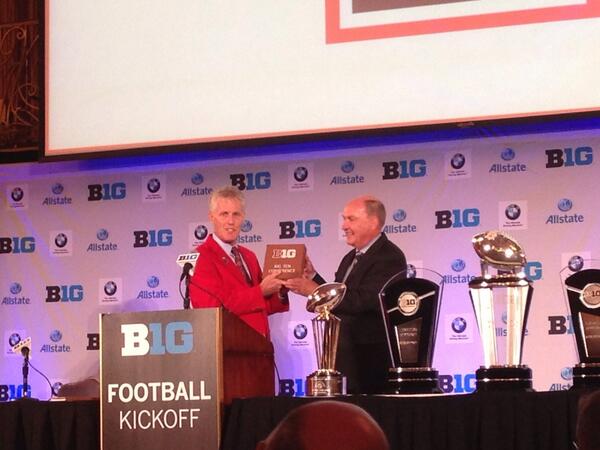
... This is the 118th season of B1G football!
... Delany says "the B1G prides itself on tradition and its ability to respond to contemporary problems." "We're challenged every decade in interesting ways." Notes they're challenged by concussions today. Mentions the B1G/Ivy League summit that happened last week.
... "We believe in the importance of intercollegiate athletics for men and women."
... Notes Rutgers/Maryland joining the conference on July 1st, 2014. "New Jersey and Maryland combined are only half the size of Indiana, but at the same time, have provided incredible opportunity to recruit students and athletes." 30% gain in population footprint increase compared to 3% geographical.
... In excess of $9 billion in federal research once expansion is complete. Conference will take up 15% of continental United States. Conference will span over 550,000 square miles. 512,000 students under roof. 350 teams. 10,000 student athletes. $150 million in financial aid. B1G is larger, bigger, and more robust.
... Notes B1G will celebrate the Rose Bowl's 100th game later this year.
... Delany is "really excited about the college football playoff," and noted they wanted to "protect the regular season and the Rose Bowl game." He's pleased with the turnout.
... Delany says football's growing popularity is "a good thing" but notes it brings challenges. Says nobody could have imagined how a sport that was regionally important and sometimes nationally growing into the national monster it is today.
... Goes on a rambling statement on social media's impact on the Arab Spring, Recruiting, and political campaigns. Drops "cloud computing." "Technology isn't going to change. [We will all] be impacted by it."
... "We need an educational trust that will help give a student-athlete a lifetime opportunity to graduate."
... Says amateur athletics is more than a "quaint ideal" to him. Notes others have different "feelings" on the issue. Says some of these issues will play out in the courts and Congress, and out of conference executives hands. Delany is a defender of the current model, says it "deserves the benefit of the doubt."
... "We need to re-evaluate the at risk students. We may need to give them more time to prepare to transition educationally." Mentions perhaps allowing them a "year of residence" to get their bearings academically that wouldn't go against their eligibility.
... "Miscellaneous expenses" needs to be implemented. Says "full cost-of-attendance" must be examined. Goes on a tangent about his laundry check during his time as a student-athlete in the 1800's.
Q&A SESSION:
... Delany says if they re-structure the NCAA without addressing substantive issues there is no point.
... Would "miscellaneous expenses" alter the competitive balance? He says higher-resource institutions already are able to attract better players over time, and it's conceivable institutions that offer higher packages could belong to same tournaments and compete against those that don't.
... Confirms athletes who leave college early in good standing could come back in 10 years and finish their education. "That's the concept."
... "The plumbing of restructuring needs a lot of work," Delnay says, but he's "very optimistic about this member organization. We're optimistic we may get it within a year."
... Delany says a "Division IV" isn't being talked about. Says discussions have been more about "needing to have a structure that allows us to do what we need to do for our athletes."
... Delany "hasn't given a lot of thought" to for-profit Grand Canyon College joining the WAC. Says he needs to think about it more before giving his opinion.
... Says commissioners have "done more complicated things" than figure out cost-of-attendance stipends.
... Goes on to admit a "miscellaneous expenses" stipend would have to pass the test of Title IX; no exceptions for football/basketball. Says it's "not going to be simple." Sees it as a grant/expense that goes to full-scholarship athletes, men and women.
... Delany says Mark Emmert has "done some good things" and "made some mistakes." "Running the NCAA is a real challenge and most of the problems we confront today preceded Mark Emmert."
... O'Bannon case doesn't represent best interests of college athletics, thinks it will be litigated all the way to the Supreme Court. Mentions Congress will have to figure out what they want to do with Title IX. Admits they're in uncharted areas.